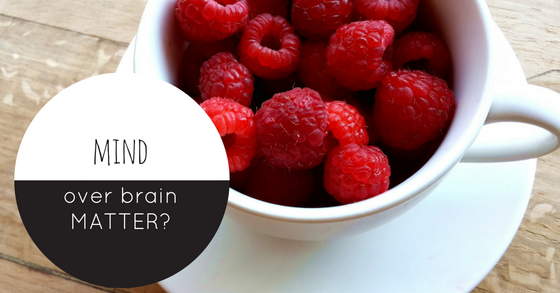“Eating MINDfully May Reduce Risk of Alzheimer’s Disease”
by Meredith Kimple
It’s estimated that Alzheimer’s disease affects about one in ten seniors over the age of 65, and 1 in 3 seniors over the age of 85. With those statistics in mind, the prevalence of Alzheimer’s can make developing the disease seem an inevitability. However, recent research suggests that certain dietary changes may significantly lower a person’s risk of developing the disorder.
The MIND diet*, created by nutritional epidemiologist Martha Clare Morris, combines the DASH and Mediterranean diets for an eating plan that promotes better brain health and may decrease one’s chance of developing Alzheimer’s. From 2004 until 2013, Dr. Morris studied the eating habits of over 900 participants aged 58 to 98 in order to determine the efficacy of the MIND diet in Alzheimer’s prevention.
The results of the study show a positive correlation between adherence to the MIND diet and a decreased risk of developing Alzheimer’s. Participants who followed the diet moderately saw their Alzheimer’s risk decrease by about 35%, while those who followed it strictly had a decrease of 53%!
The MIND diet is composed of 10 food groups that promote brain health:
- Whole grains (3 servings a day) Substitute whole wheat breads for white, choose brown rice or quinoa in place of white rice, and have oatmeal or a whole-wheat cereal in the morning.
- Leafy green vegetables (at least 1 serving a day) Spinach, kale, collards, broccoli and cabbage are fine choices. The MIND diet suggests meals be made up primarily of vegetables.
- Other vegetables (at least 1 serving a day) Carrots, peas, peppers, tomatoes, radishes, sweet potatoes, beets and more.
- Nuts (at least 1 serving a day) Nuts are recommended for daily snacks and provide essential healthy fats that can improve brain function.
- Beans (1 serving every other day) Beans can be added to soups, stews and salads, so they are very versatile and easy to work into your current diet.
- Berries (at least 2 servings a week) Add berries to your morning cereal or oatmeal, or eat them as is for a healthy snack or dessert. Eating a variety of berries can help with brain function.
- Poultry (at least 2 servings a week) Chicken and turkey are excellent choices when you want to have a meat-based dish for lunch or dinner. While the MIND diet places greater emphasis on vegetables, poultry is a brain-healthy option for getting in your recommended protein.
- Fish (at least 1 serving a week) Fish is another good source of protein while following the MIND diet.
- Olive oil Instead of using butter, cook your food with olive oil. Food tastes just as good without the additional fat.
- Wine (1 glass a day) Wine lovers rejoice! A glass of wine once a day can be great for your brain health.
The MIND diet asks that you keep the following 5 food groups to a minimum when planning your meals:
- Red meat: Beef, sausage, steak and burgers are fine on occasion, but try to substitute them with chicken or turkey alternatives whenever you can.
- Butter and margarine: (less than a tablespoon a day) Use a vegetable-based butter substitute on breads, and use olive oil for cooking.
- Cheese: (less than 1 serving a week) This is perhaps one of the most difficult foods to limit, but do your best to avoid cheese. There are dairy-free cheese substitutes available if you really miss it.
- Sweets and pastries: (less than 1 serving a week) Try to limit your sugar intake and treat yourself to a favorite dessert only once a week.
- Fried or fast food: (less than 1 serving a week) Eliminate fried or fast foods from your diet. Baked dishes can be more flavorful and are much better for you.
The MIND diet may seem too restrictive at first glance, and if that’s the case, try easing into it slowly. Instead of taking away, add in. Eat more leafy greens, vegetables and whole grains. Snack on nuts and berries instead of chips or pretzels. Once you start making changes you may feel more comfortable substituting and restricting foods in the unhealthy categories. Whatever you can do in the moment is worth it for your health. Though the MIND diet is geared toward brain health and Alzheimer’s prevention, it may also improve cardiovascular function, lower blood pressure, and lead to weight loss.
While the MIND diet has not been named a foolproof tool for Alzheimer’s prevention, the results of Dr. Morris’s study indicate that dedicated adherence to such an eating plan may significantly lower one’s risk. The study took into account other factors that contribute to the development of Alzheimer’s, but found that what we eat seems to have the greatest impact on our mental health. Though the nutritional specifics of the MIND diet need further development as research continues, the current dietary suggestions it offers have proven effective for those participants who followed them the longest.
The prevalence and mystery of Alzheimer’s disease can make us feel powerless to prevent it. While there is still so much that doctors and health professionals have yet to determine about the disease, the MIND diet offers us the opportunity to minimize our risk and take control of our bodies in the present moment. Eating well is a choice that gives us some of that power back, and in making that choice, we are allowed some say in the functioning of our minds.
*Before trying a new diet, it’s always best to discuss any changes in your diet with your health care provider to make sure that it is right for you.



